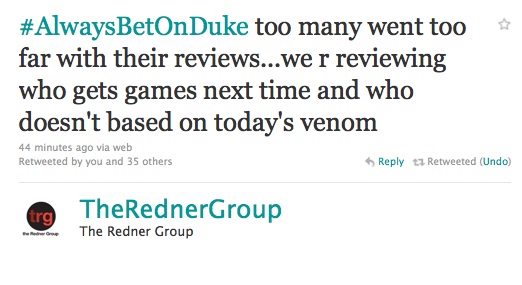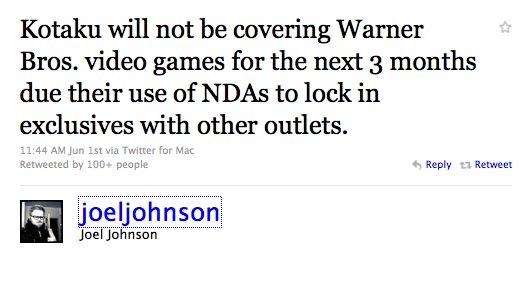Update: 2K Games has officially weighed in on the issue. "2K Games does not endorse the comments made by Jim Redner and we can confirm that The Redner Group no longer represents our products. We have always maintained a mutually-respectful working relationship with the press and do not condone his actions in any way."
A large part of my job is dealing with people who work in public relations. The vast majority of those whose do PR for video game companies are polite, well-intentioned, and extremely professional. They need us to get their games coverage, and we need them for access to the developers and early code to review games in a timely manner. The press and PR relationship may sometimes be strained, but it's rarely adversarial.
That is, until the Redner Group's official Twitter account posted something you almost never see: an open threat stating that outlets who reviewed Duke Nukem Forever poorly may not receive review copies of games in the future. Anyone who has done this job for any amount of time has suffered through a dry spell after giving a publisher a bad review, but this is the first time the threat of a blacklist has been made public.
Some went too far
"Too many went too far with their reviews...we are reviewing who gets games next time and who doesn't based on today's venom," the company tweeted. "Bad scores are fine. Venom filled reviews...that's completely different," another tweet read. Currently, Duke Nukem Forever has a Metacritic score of 49 on the Xbox 360, the format most commonly sent to the press. For a game with such a large marketing budget and name recognition, that's shockingly low.

It's not, however, that surprising. The game received tepid write-ups after the Las Vegas preview event, and industry gossip always painted the game as a barely finished product. It's hard to find a good review for the game, although the PC version of Duke Nukem Forever seems to be doing slightly better than the console port. The game will sell well regardless—Duke Nukem Forever is the definition of a release that's critic-proof—but no one feels good when their game is beaten up so badly by the reviews.
Blacklists are common, but rarely public
What's shocking about that tweet isn't that some outlets may get blacklisted—that's something you risk every time you give a game a low score, but that the Redner Group would release a public statement letting outlets know they are on notice if they went "too far" in their review. This sends a chilling message to those who review games professionally: hold your tongue if you feel strongly about a game, or you may not have timely coverage of a future release.
I contacted Jim Redner for comment on this story, and this is the response I received:
I have had a wonderful relationship working with you in the past. I plan to continue working with you in the future on all projects, if you will allow me.
I believe reviews are completely subjective. Everyone is welcome to their own opinion and opinions are never wrong.
It is not my intention to bully anyone. I over reacted. I just voiced an opinion. I have poured my heart into this project and I just want it to succeed.
It is my hope that you understand.
Another tweet was posted publicly apologizing, and a longer, more personal apology was sent, although that wasn't made available for publication.
"In a situation where a game receives a bad score, it's important to realize that these reviews and scores are delivered as a means of telling a customer whether to buy a game," another person working PR told me, on the condition he would not be identified. "It's a learning opportunity—see what wasn't liked, and come back stronger with a better game next time." They pointed out that a bad score isn't malicious, it's only a reviewer saying they didn't like the game.
During my years as a game reviewer I've grown close to a number of writers at other sites, and I've also enjoyed long working relationships with many people working public relations. Speaking generally, I've known people both on the giving and receiving end of blacklists, and it's an ugly (but private) weapon used against—and sometimes by—the press. That's why it's so insidious: it's nearly impossible to prove that interview opportunities are being held back or review copies aren't being sent due to a prior, negative review.

Our Duke Nukem Forever review was tough, but I stand by every word of it. It's never worth pulling a punch when you talk about a game due to fear of retaliation. The professionals in PR understand that bad reviews happen, and those that will punish you for them come and go. It's your readers that are important, and when you're faced with this kind of behavior, the only sane thing to do is shine a bright light on it and let everyone know you won't be pushed around.
While PR does control much of who I talk to, what I see, and how early I play something, the industry needs writers to talk about their games and to promote the exceptional work that is released on a regular basis. Reviewers need to feel free to write what they feel about games, and PR needs to understand that not every game deserves praise. Threatening outlets is never a winning strategy, and in many cases it may actually backfire.
reader comments
305